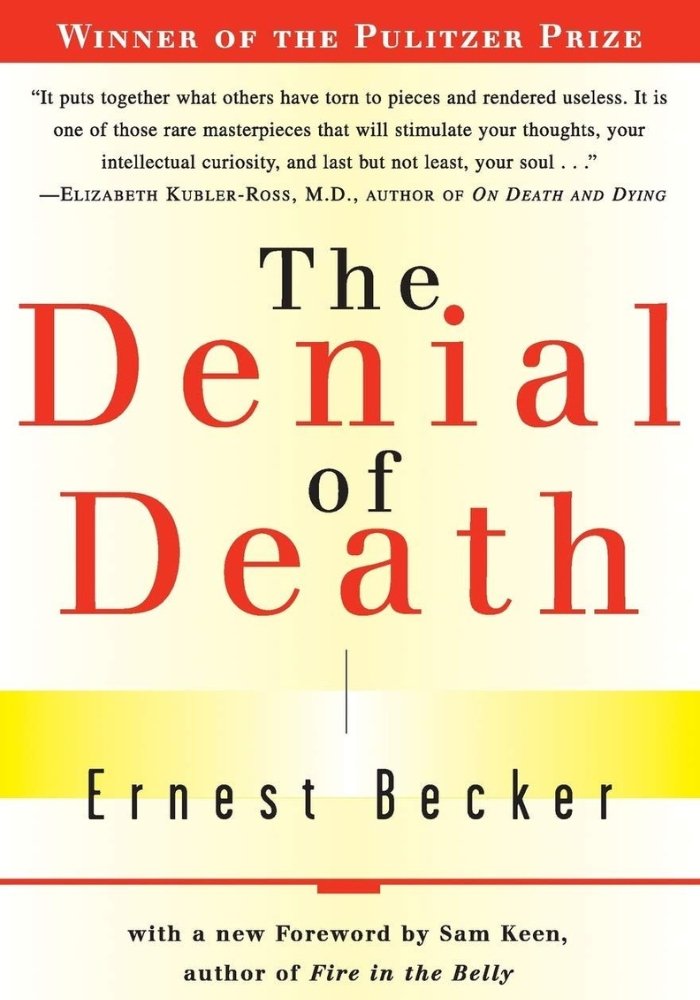Introduction
Ernest Becker’s *The Denial of Death* examines the impact of mortality on the human psyche. This Pulitzer Prize-winning book confronts our deep-seated fears and challenges us to understand our existence. In this review, I offer a clear analysis of Becker’s unique perspectives, focusing on his arguments about how mortality shapes human behavior and culture. My aim is to present key takeaways that enhance your understanding of these complex themes, providing insights that are both reflective and practical. Join me as we explore Becker’s compelling arguments, simplifying complex ideas about life and death.
The Heart of Becker’s Argument
Ernest Becker’s *The Denial of Death* centers on a compelling concept: our deep fear of death fundamentally drives our actions. He introduces the idea of “death anxiety,” a powerful motivator that pushes us towards cultural beliefs and achievements that offer a sense of lasting impact, mitigating our fear of being forgotten. Becker vividly describes this as a defense against the looming oblivion. “The idea of death, the fear of it, haunts the human animal like nothing else,” he asserts. This fear not only highlights our vulnerability but also propels us on a relentless pursuit of meaning. By understanding these dynamics, we see how everyday choices and broad cultural phenomena stem from our attempts to outwit mortality.
The Hero System: A Double-Edged Sword
Ernest Becker’s notion of the ‘hero system’ serves as both refuge and cage. It provides a means to transcend mortality by achieving cultural significance and conforming to societal norms. However, this same pursuit can ensnare us, leading to lives dominated by unachievable societal standards lives less examined and more performed. This duality raises a critical question: Are we living authentically, or merely playing roles dictated by the structures of our society? Understanding this can help us navigate the delicate balance between societal contribution and personal authenticity.
The Role of Character and Personality
According to Ernest Becker, our character is more than just our identity, it acts as a fortress against the terror of death. This narrative we build around ourselves helps us resist the overwhelming anxiety that comes with the awareness of our mortality. It’s a poignant insight into the roots of our behavior, prompting us to question the authenticity of our personalities. Are we truly the architects of our character, or have we constructed our identities as mere armor against the inevitable end? Such reflection invites us to explore the depth of our constructed selves and consider the possibility of reshaping them in pursuit of a more authentic existence.
The Double-edged Sword of Human Consciousness
Ernest Becker explores the dual nature of human consciousness in *The Denial of Death*. While it gifts us with the capacity to imagine and plan for futures beyond our own lifetimes, it also burdens us with the knowledge of our inevitable end. This duality sparks a profound inner conflict: our ambitions and dreams are fueled by the same awareness that leads to existential dread. This consciousness drives us to strive for greatness as we seek to leave a lasting mark, yet it can just as easily spiral into despair when we face the harsh realities of our transient existence. By connecting this universal dilemma to personal aspirations and fears, Becker’s analysis becomes deeply resonant, offering a clearer lens through which we view our everyday decisions and the broader human condition.
The Denial of Death and Mental Health
In *The Denial of Death*, Ernest Becker provides a unique perspective on the interplay between mortality and mental health. He argues that our subconscious evasion of death’s reality shapes various psychological conditions, ranging from neuroses to profound existential crises. For instance, an excessive preoccupation with legacy might mask a deep-seated fear of insignificance due to mortality. Becker’s insights suggest that much of our psychological suffering stems from this denial, offering a new framework to understand disorders like anxiety and depression. By applying his theories to current mental health practices, we might better address the root causes of these conditions, potentially leading to more effective treatments that acknowledge the existential dimensions of mental health.
Personal Reflections: A Lens on Life
Reading *The Denial of Death* by Ernest Becker was transformative, like discovering a hidden doorway. The book not only made me face my fears and desires but also altered how I perceive my existence. The stark realization that our lives unfold under the constant, albeit subtle, presence of mortality struck me deeply. This awareness paradoxically fuels our drive to find meaning, to create, to love, and to dream. A particular quote from Becker resonated profoundly: “Man cannot endure his own littleness unless he can translate it into meaningfulness on the largest possible level.” This statement has become a lens through which I view my daily actions and long-term goals, pushing me to infuse my everyday decisions with greater purpose. It challenged my understanding of significance in an indifferent universe, prompting a shift in how I approach relationships and personal achievements, making each more intentional and reflective of my values.
Applying Becker’s Insights
Applying Ernest Becker’s insights into our lives involves a few transformative steps. Firstly, by truly acknowledging our mortality, we can begin to focus on what genuinely matters this might mean choosing careers, relationships, and hobbies that align more closely with our core values rather than those that offer superficial status or ephemeral satisfaction. Secondly, understanding the hero systems we engage with allows us to critically assess whether they resonate with our true selves or serve as mere distractions from our mortality. For instance, if we find ourselves overly focused on accumulating wealth as a means to ‘leave a mark,’ we might reconsider whether this pursuit genuinely aligns with our personal values or is simply a culturally endorsed escape from facing the finite nature of life. By doing so, we can start to dismantle unhelpful constructs and instead build lives that are not only meaningful but also deeply fulfilling.
Conclusion: Embracing the Inevitable
In the final analysis, The Denial of Death teaches us that recognizing our mortality is not a curse but a profound gift. It invites us to live fully and authentically, to treasure every moment, and to pursue a life that resonates through time not to defy death, but to accept our finite existence. Ernest Becker poignantly notes, ‘The most terrifying thing about life is not that it ends, but that we might not fully live it.’ His work serves as a clarion call to embrace life’s beauty and tragedy and to find meaning in our inevitable end. This journey is not easy, but it is undeniably crucial.
Writing this review has allowed me to explore my own fears and aspirations deeply. The Denial of Death is more than a book, it is a philosophical guide on the journey to comprehend human existence. For those willing to face its truths, it offers not just insights but a roadmap to a life lived in the full awareness of our mortality. This book is an invitation to not only step into the light of our mortality but also to dance with the joy of being truly alive. It’s a journey well worth taking, urging us to not just exist, but to live meaningfully.






